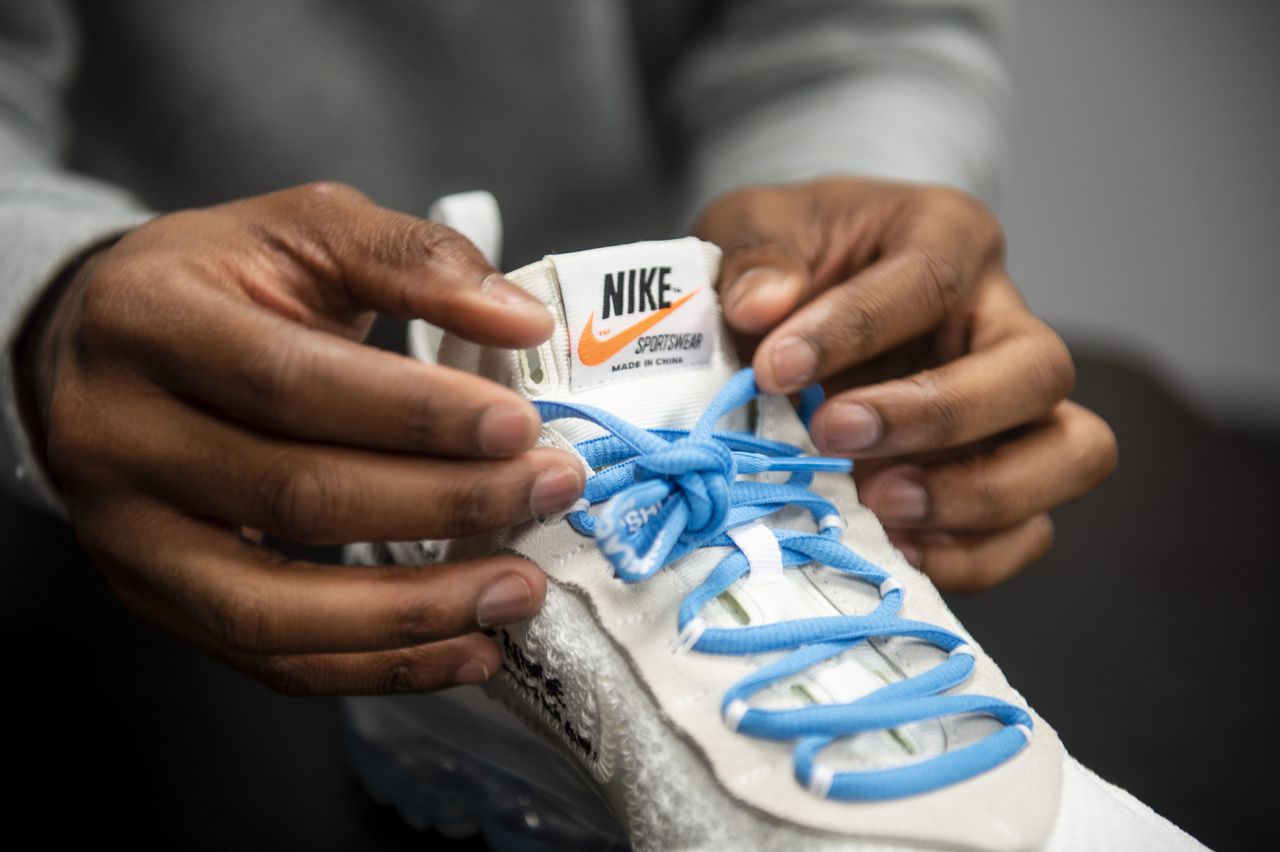Nike escalated its legal battle with StockX by alleging the Michigan-based online marketplace is selling counterfeit sneakers. (MLive file photo by Kaytie Boomer)Kaytie Boomer | MLive.com
Nike intensified its legal battle with StockX earlier this month when it alleged the Michigan-based online marketplace sold counterfeit sneakers.
This follows a February lawsuit that claims StockX is illegally using Nike’s trademark by selling digital versions of the brand’s sneakers. In an amended complaint filed in the U.S. District Court of Southern New York by New York-based law firm DLA Piper, Nike attacked the crown jewel of StockX’s business: authenticity.
StockX, a $3.8 billion online sneaker and streetwear resale marketplace, acts as a middleman between buyers and sellers. When a customer buys a pair of sneakers, for example, the seller sends the shoes to StockX to authenticate the brand, often big names like Nike, Adidas, Reebok or New Balance.
Related: Nike sues Michigan-based marketplace over virtual sneakers sold as NFTs
Despite StockX boasting a 99.96% accuracy rate on its website, Nike claims counterfeit sneakers are going out the reseller’s doors.
“Since December 2021 and continuing through the filing of this action, Nike has obtained from StockX four pairs of purportedly ‘authenticated’ Nike-branded shoes that Nike has verified are, in fact, counterfeit,” DLA Piper attorneys wrote in the lawsuit.
The now 72-page complaint says the counterfeit sneakers, purchased over a two-month period, had a “verified authentic” tag and came with a paper receipt saying the shoes were “100% authentic.”
StockX responded to this claim saying it has invested millions into fighting the “proliferation of counterfeit products” in its marketplace.
“Nike’s latest filing is not only baseless but also is curious given that their own brand protection team has communicated confidence in our authentication program, and that hundreds of Nike employees – including current senior executives – use StockX to buy and sell products,” the Detroit-based company said in an online statement.
This legal battle kicked off in February shortly after StockX launched its Vault NFT, non-fungible token, service.
The NFTs, which look like a digital image, act as proof of ownership of a physical product. They allow customers to trade sneakers more easily and store rare products in StockX’s vault, the company says.
Nike says the virtual products were “created, marketed, offered for sale and sold” without its consent. In the updated court filing, lawyers also allege a counterfeit pair of Air Jordan 1 Retro High OGs were being sold as an NFT.
“StockX depicts the same shoe on one of the eight Nike branded NFTs for sale on StockX’s platform, which is also currently StockX’s top-selling NFT by total volume sold,” the lawsuit says.
A StockX sale history shows the Air Jordan 1 Retro High OG NFT was first sold for $501 in February. After 100 sales, it’s now listed for $295.
Related: A Michigan-based online marketplace is selling NFTs of sneakers. What does that mean?
StockX has sold more than 550 Nike-branded NFTs, according to the lawsuit, and has minted another 2,000. Other NFT Vault products currently for sale include valuable Pokeman cards, action figures and sneakers from brands like Adidas and New Balance.
“Nike’s challenge has no merit and clearly demonstrates their lack of understanding of the modern marketplace,” StockX said.
Reselling sneakers is big business.
Simple supply and demand dictate the secondary market: Limited edition sneakers from big brands often sell out quickly, gain value and are resold at a higher price.
Currently valued at $2 billion in North America by analysis from Cowen, the resale industry has the potential to reach $30 billion by 2030—a big chunk of the global $85 billion sneaker marketplace.
Sneaker brands don’t make any direct profit from this secondary marketplace, as companies like StockX and its sellers bring in billions. But Cowen says it creates a “powerful halo” for the primary market by increasing the hype and average selling price around limited-edition shoes.
Nike asked the court to “swiftly and permanently” stop StockX from selling NFTs with its trademarks, counterfeit Nike products and from making “false and/or misleading claims” about the authenticity of its goods.
StockX says it plans to “vigorously defend our position” and continues to dispute Nike’s claims.
More on MLive:
Gas prices keep surging. What does that mean for summer road trips in Michigan?
With another $9.5M in ads, Michigan plans to ‘keep trying’ to boost COVID vaccinations
Michigan loses Stellantis project to Indiana. The state must “raise the level of our game.”
Note to readers: if you purchase something through one of our affiliate links we may earn a commission.
Registration on or use of this site constitutes acceptance of our User Agreement, Privacy Policy and Cookie Statement, and Your California Privacy Rights (User Agreement updated 1/1/21. Privacy Policy and Cookie Statement updated 5/1/2021).
Cookie Settings
© 2022 Advance Local Media LLC. All rights reserved (About Us).
The material on this site may not be reproduced, distributed, transmitted, cached or otherwise used, except with the prior written permission of Advance Local.
Community Rules apply to all content you upload or otherwise submit to this site.
Author
Administraroot

